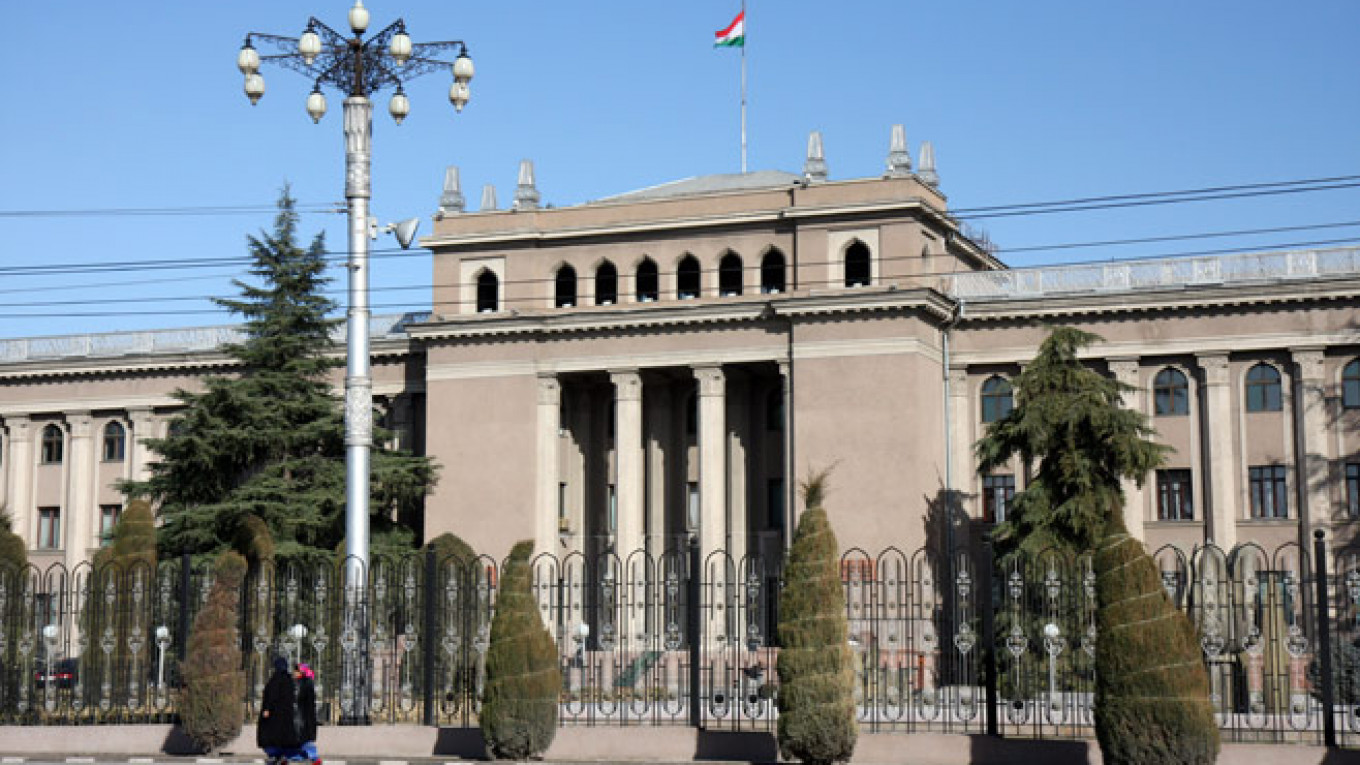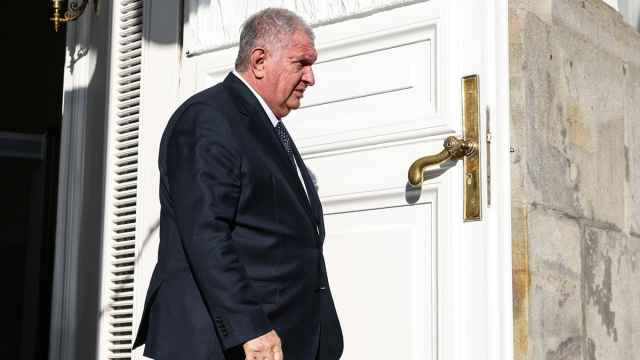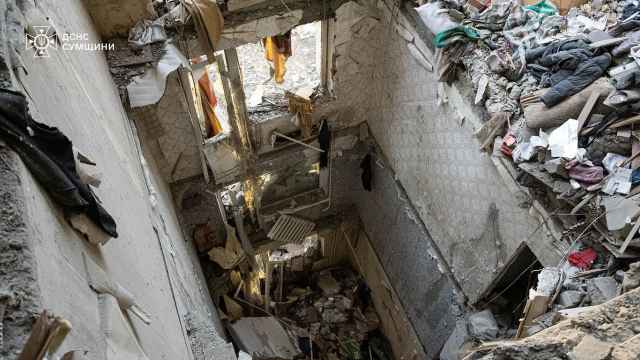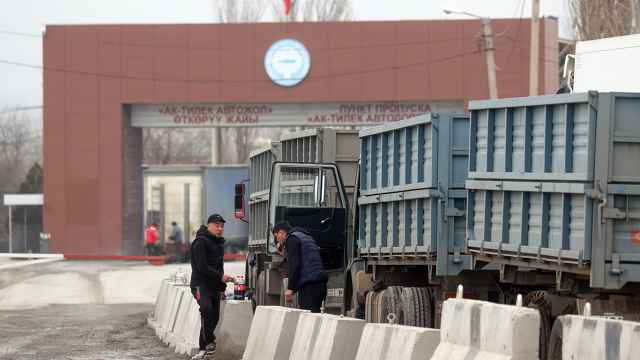Plans to demolish some of the most popular landmarks in Tajikistan's capital have sparked outrage. But with political repression intensifying, many residents in Dushanbe are being careful when expressing their feelings in public.
In a desperate bid to halt the destruction, hundreds of city residents have signed an online petition addressed to President Emomali Rahmon and Dushanbe Mayor Mahmadsaid Ubaidulloev, who is also speaker of parliament. The petition drew more than 600 signatures in the first day alone.
Sites in the Dushanbe authorities' crosshairs include the Rokhat teahouse — a regular destination for visiting tourists — two theaters, the former presidential administration, the mayor's office and the parliament building. The structures are all the handiwork of Soviet-era architects, many of whom were relocated to Tajikistan during World War II.
Reacting to a wave of Internet grumbling, Nurali Saidzoda, deputy head of the government's architecture and construction committee, told the Asia-Plus newspaper that the buildings selected for demolition were of negligible value and needed replacing with modern hi-tech substitutes.
In the case of at least two sites — the presidential palace and the parliament — Saidzoda's argument is in direct contradiction to the Culture Ministry's recognition of the buildings as historical monuments. Their removal would technically be in breach of the law.
Critics of the redevelopment plans are caustic about what they say is the authorities' lack of architectural taste.
"They are victims of their own crassness, vulgarity and shortsightedness. It is impossible to contemplate the illogicality and conceptual squalidness of the buildings that have gone up in Dushanbe over the last five years," Anisa Sobiri, a well-known Tajik writer and poet, told EurasiaNet.org.
A master plan to reinvent the capital city has been gaining momentum in recent years and has led to numerous Soviet-era government offices being removed to make way for hastily built replacements.
One notorious late addition to the cityscape is the Dushanbe Plaza, a largely vacant 22-story business center dubbed the "wedding cake" for its higgledy-piggledy, pastel-hued melange of architectural styles. The bar at the top of the tower is known as a partying venue for children of the wealthy.
New constructions in Dushanbe are often distinguishable for size vastly out of scale with requirements.
A national library, completed at a cost of $40 million and designed to hold a collection of 10 million books, was opened in 2012. The number of books now in the collection — mainly cast-offs donated by the general public — is still relatively small, so the premises are instead used to host public events.
Anger about the direction in which the city is headed has been confined mostly to the relative safety of the Internet. Online critics have been busy exchanging expressions of contempt for the city authorities. "We should tell those crooks that they insult the citizens with their silly initiatives and careless spending of funds in this time of crisis and stagnation," one Facebook user said.
The names of Facebook users are not being published out of concern about potential reprisals against them by authorities.
With Tajikistan currently in the grip of another wave of political repression — this one targeting the last opposition force still operating, the Islamic Renaissance Party — online critics concede there is little chance that frustration could boil over into street protests.
"Dare to join a demonstration, and in the blink of an eye you'll be arrested and accused of being a member of Islamic State," another Facebook user remarked dolefully.
Among the many pictures being circulated online as a gesture of unhappiness is one of Nurali Saidzoda, the government official arguing for the redevelopment, stamped with the red block letter "Under Demolition."
As to the motivations for the desire to recast the image of Dushanbe, two theories prevail online.
One is that officials are eager to promote an exclusively ethnic Tajik national identity by removing architectural traces of the Soviet legacy. Another popular theory holds that corrupt officials are looking to profit from potential kickbacks and embezzlement associated with new construction projects.
Although property prices across the board are sliding, prime real estate still remains robustly profitable, so the incentive to build in prime areas is strong.
"Downtown areas are lucrative. Elite property is a specific segment of the market, where buyers are paying for exclusivity," Dushanbe-based economist Konstantin Bondarenko told EurasiaNet.org.
Bondarenko said some of the public properties being targeted for removal are especially attractive as no compensation payouts are required, since the buildings "belong to nobody."
"Factors like this are a serious motivation when making decisions on demolition, even though the sites are of cultural and historical value," Bondarenko said.
There are very few construction companies in Tajikistan, and all of them have connections to influential government officials or their relatives.
Last year, Beg Zukhurov, head of the state communications agency and a relation of the president by marriage, oversaw the demolition of another Dushanbe landmark — the downtown central post office. A soaring, 30-story building that will outstrip even the Dushanbe Plaza is earmarked for the spot and will house the communications agency.
The property will be added to an already impressive real estate portfolio under Zukhurov's control. In August, the communications agency opened a hotel and swimming complex in the town of Kulyab, which has traditionally been deemed the power base of the president's entourage.
The anti-demolition petition calls for the preservation of what it says "was built with love by our ancestors."
"All these buildings symbolize the motherland — for those who live in Tajikistan and for those who live abroad," reads the petition, which even its proponents acknowledge stands little chance of altering demolition plans.
Originally published by EurasiaNet.org.
A Message from The Moscow Times:
Dear readers,
We are facing unprecedented challenges. Russia's Prosecutor General's Office has designated The Moscow Times as an "undesirable" organization, criminalizing our work and putting our staff at risk of prosecution. This follows our earlier unjust labeling as a "foreign agent."
These actions are direct attempts to silence independent journalism in Russia. The authorities claim our work "discredits the decisions of the Russian leadership." We see things differently: we strive to provide accurate, unbiased reporting on Russia.
We, the journalists of The Moscow Times, refuse to be silenced. But to continue our work, we need your help.
Your support, no matter how small, makes a world of difference. If you can, please support us monthly starting from just $2. It's quick to set up, and every contribution makes a significant impact.
By supporting The Moscow Times, you're defending open, independent journalism in the face of repression. Thank you for standing with us.
Remind me later.






